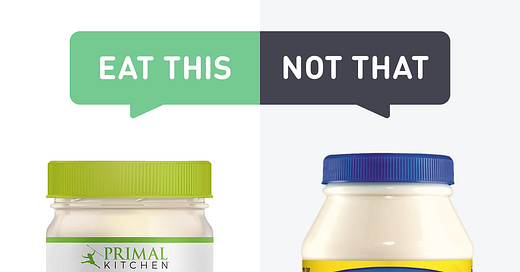What is wrong with vegetable oils?
Have you ever told someone you’re avoiding vegetable oils and got a blank stare in return? Although companies defend them as “heart-healthy,” polyunsaturated fats (PUFAs) derived from soybean, safflower, sunflower, corn, sesame, peanut, rice bran, grapeseed, and cottonseed are anything but good for you. These factory-made products turn a big profit while wreaking havoc inside the human body. And they are ubiquitous in our food system, finding their way into condiments, sauces, packaged foods, restaurant fryers, and even spice mixes!
To make these edible oils, the manufacturer first extracts seed oil using a chemical solvent like hexane. Next, the oil is heated to extremely high temps to remove the solvent. Finally, the liquid is bleached and deodorized to resemble the bottled oil you see on grocery store shelves. This flow chart for Edible Oil Processing, created by the Weston A. Price Foundation, gives a detailed view of all the steps involved.
The result of this manufacturing process is a highly unstable liquid fat that reacts when exposed to light, oxygen, or heat — meaning, it oxidizes easily and goes rancid fast. Even worse, researchers are finding these oils can stay in the body for two years or more because they are absorbed into our cell membranes.
Put this kind of fuel into your body on a regular basis and you are setting the stage for an imbalance of essential fatty acids; specifically, too many omega-6s relative to omega-3s. This in turn can lead to increased inflammation, metabolic dysfunction, hormone disruption, autoimmune flare-ups, premature aging, acne, and a host of other adverse effects.
So what’s a healthy eater to do?
Get rid of seed oils now. Throw away those bottles of vegetable oil, corn oil, or canola oil that have been sitting by the stove. Never cook with them again. Purge the fridge of mayo, salad dressings, dips, and other offenders. Find different brands that don’t use PUFAs, or learn to DIY some basic condiments like this homemade ranch dressing.
Shift away from ultra-processed foods. It’s hard to go cold-turkey on convenience foods. When you do buy them, read labels obsessively to limit your consumption of vegetable oils.
Watch out for tricky advertising. For example, Country Crock’s “plant butter” is really margarine; Hellmann’s mayo “with olive oil” lists canola as the first ingredient; an olive oil “blend” is codeword for vegetable oil mixed in; Kerrygold’s butter with canola oil is another no-go.
Avoid fried food in restaurants. Those vats of oil used for frying oxidize with every re-use. Steer clear.
Cook with animal fats. Use lard, tallow, butter, bacon drippings, or schmalz for medium- to high-heat cooking; and only cold-pressed, unrefined olive oil, avocado oil, or coconut oil for baking and homemade dressings.
Want to learn more? Held March 3, 2022, the Future of Fat virtual summit brought together some of the leading researchers to raise awareness about the toxic effects of vegetable oils. You can watch all of the talks on YouTube with a free registration.
In addition:
Follow independent researcher Tucker Goodrich, who has been sounding the alarm about seed oils for many years.
For a comprehensive explainer of edible fats and oils, see Dr. Cate’s List of Good Fats and Oils versus Bad.
Watch how canola oil is made from rapeseed.
Are you avoiding seed oils already? Share your experience or ask more questions in the coaching window of the Senza app.




